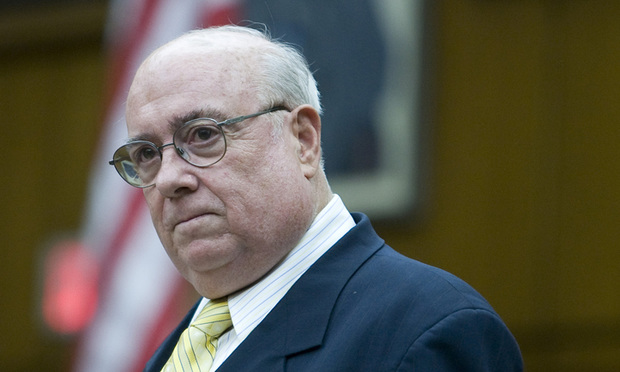DC Circuit Tells Lawyers in Clinton Emails Case: What's Left to Resolve?
Hillary Clinton's lawyers at Williams & Connolly, pointing to a 2018 D.C. Circuit decision, have argued there's no basis for a deposition. Judicial Watch, the plaintiff in the public-records case, contends the dispute is not moot.
May 14, 2020 at 03:24 PM
5 minute read
 Williams & Connolly offices in Washington, D.C. Photo by Diego M. Radzinschi/ THE NATIONAL LAW JOURNAL
Williams & Connolly offices in Washington, D.C. Photo by Diego M. Radzinschi/ THE NATIONAL LAW JOURNAL
A federal appeals court panel on Thursday injected some doubt over whether Hillary Clinton will be forced to sit for a rare deposition confronting her practice of using a private email server during her time as U.S. secretary of state.
The new order from the U.S. Court of Appeals for the D.C. Circuit asked the lawyers in the Freedom of Information Act case to address whether there is still a pending controversy to resolve. A panel of judges—Thomas Griffith, Cornelia Pillard and Robert Wilkins—on Thursday set oral argument for June 3.
The hearing in the D.C. Circuit comes in the case Judicial Watch v. Clinton, a public-records case involving a request for State Department documents and communication about the 2012 terror attack at the U.S. mission in Benghazi, Libya. U.S. Ambassador J. Christopher Stevens was killed in the attack.
The Benghazi attack and Clinton's use of a private email server as secretary of state have long been flash points for Republicans on Capitol Hill, and Clinton's email practices were the centerpiece of an FBI investigation—in the months leading up to the 2016 presidential election—about her handling of classified information.
Clinton's lawyers are challenging a March 2 order from U.S. District Judge Royce Lamberth, who said Clinton's written responses in the public-records litigation to questions about her email practices "were either incomplete, unhelpful, or cursory at best. Simply put, her responses left many more questions than answers."
Williams & Connolly partner David Kendall, lead counsel for Clinton, has argued she has broadly addressed her private email before Congress, the FBI and news reporters, and therefore she has nothing more to say.
"The Benghazi Select Committee, the State Department Inspector General, and the FBI all conducted inquiries and made findings on her use of private email," Kendall wrote in Clinton's D.C. Circuit filing in March. Clinton has testified under oath that she used private email for convenience, her lawyers said in court filings.
Depositions of current or former cabinet officials are rare, and plaintiffs face a high burden to prove that "extraordinary circumstances" compel such testimony. The Justice Department has long resisted efforts to depose high-ranking officials. DOJ, however, is not backing Clinton in her appeal in the D.C. Circuit. The government has said the deposition would not touch on official policy but compliance with FOIA.
Tom Fitton, the president of Judicial Watch, has called Clinton's appeal in the D.C. Circuit a "desperate act" that delays "truth and accountability for her email conduct and how it impacted the people's 'right to know' under FOIA."
The D.C. Circuit wants Clinton and Judicial Watch to address a 2018 decision involving Clinton's emails. Judicial Watch, the plaintiff in the earlier case, sought to force Obama and Trump secretaries of state to initiate an enforcement action, through the U.S. Justice Department, to recover any missing Clinton emails. The suit was filed under the Federal Records Act.
The 2018 panel—Judges David Tatel, Harry Edwards and Douglas Ginsburg—determined that no "imaginable" enforcement action would recover any missing emails. "The district court found that the government has already taken every reasonable action to retrieve any remaining emails," the judge said in their order.
"The parties should be prepared to discuss whether this case is moot, see Judicial Watch v. Pompeo, and, in particular, how the material to be covered in the petitioners' depositions is relevant to the adequacy of the Freedom of Information Act searches responsive to the request at issue in this case," Griffith, Pillard and Wilkins said in Thursday's order.
 U.S. District Judge Royce Lamberth in Washington. Credit: Diego M. Radzinschi / The NLJ
U.S. District Judge Royce Lamberth in Washington. Credit: Diego M. Radzinschi / The NLJClinton's lawyers pointed to the 2018 decision to argue the current dispute is moot and Clinton should not be forced to sit for a deposition. They also contend Lamberth's order allowing a deposition "violates the well-established principle that high-ranking government officials should not be subjected to depositions absent extraordinary circumstances."
Judicial Watch's legal team has argued in the D.C. Circuit that the new Clinton dispute is still alive, and that the 2018 decision in the case Judicial Watch v. Pompeo does not resolve the case.
"Pompeo did not address the reasonableness of State's search for records responsive to respondent's FOIA request," Judicial Watch's Ramona Cotca recently told the D.C. Circuit. "Nor did Pompeo find there were no more emails for State to locate or that State was not obligated to look for them."
Read more:
US Justice Dept. Opposes Hillary Clinton's Challenge to Rare Deposition Order
Hillary Clinton's Appeal Argues No 'Extraordinary Circumstances' Justify Deposition
'Extraordinary Circumstances': A Brief History of Top Federal Officials Ordered to Testify
This content has been archived. It is available through our partners, LexisNexis® and Bloomberg Law.
To view this content, please continue to their sites.
Not a Lexis Subscriber?
Subscribe Now
Not a Bloomberg Law Subscriber?
Subscribe Now
NOT FOR REPRINT
© 2025 ALM Global, LLC, All Rights Reserved. Request academic re-use from www.copyright.com. All other uses, submit a request to [email protected]. For more information visit Asset & Logo Licensing.
You Might Like
View All

'You Became a Corrupt Politician': Judge Gives Prison Time to Former Sen. Robert Menendez for Corruption Conviction
5 minute read
Sidley Adds Ex-DOJ Criminal Division Deputy Leader, Paul Hastings Adds REIT Partner, in Latest DC Hiring
3 minute read
‘High Demand’: Former Trump Admin Lawyers Leverage Connections for Big Law Work, Jobs
4 minute readLaw Firms Mentioned
Trending Stories
- 1Law Firms Expand Scope of Immigration Expertise, Amid Blitz of Trump Orders
- 2Latest Boutique Combination in Florida Continues Am Law 200 Merger Activity
- 3Sarno da Costa D’Aniello Maceri LLC Announces Addition of New Office in Eatontown, NJ, and Named Partner
- 4Friday Newspaper
- 5Public Notices/Calendars
Who Got The Work
J. Brugh Lower of Gibbons has entered an appearance for industrial equipment supplier Devco Corporation in a pending trademark infringement lawsuit. The suit, accusing the defendant of selling knock-off Graco products, was filed Dec. 18 in New Jersey District Court by Rivkin Radler on behalf of Graco Inc. and Graco Minnesota. The case, assigned to U.S. District Judge Zahid N. Quraishi, is 3:24-cv-11294, Graco Inc. et al v. Devco Corporation.
Who Got The Work
Rebecca Maller-Stein and Kent A. Yalowitz of Arnold & Porter Kaye Scholer have entered their appearances for Hanaco Venture Capital and its executives, Lior Prosor and David Frankel, in a pending securities lawsuit. The action, filed on Dec. 24 in New York Southern District Court by Zell, Aron & Co. on behalf of Goldeneye Advisors, accuses the defendants of negligently and fraudulently managing the plaintiff's $1 million investment. The case, assigned to U.S. District Judge Vernon S. Broderick, is 1:24-cv-09918, Goldeneye Advisors, LLC v. Hanaco Venture Capital, Ltd. et al.
Who Got The Work
Attorneys from A&O Shearman has stepped in as defense counsel for Toronto-Dominion Bank and other defendants in a pending securities class action. The suit, filed Dec. 11 in New York Southern District Court by Bleichmar Fonti & Auld, accuses the defendants of concealing the bank's 'pervasive' deficiencies in regards to its compliance with the Bank Secrecy Act and the quality of its anti-money laundering controls. The case, assigned to U.S. District Judge Arun Subramanian, is 1:24-cv-09445, Gonzalez v. The Toronto-Dominion Bank et al.
Who Got The Work
Crown Castle International, a Pennsylvania company providing shared communications infrastructure, has turned to Luke D. Wolf of Gordon Rees Scully Mansukhani to fend off a pending breach-of-contract lawsuit. The court action, filed Nov. 25 in Michigan Eastern District Court by Hooper Hathaway PC on behalf of The Town Residences LLC, accuses Crown Castle of failing to transfer approximately $30,000 in utility payments from T-Mobile in breach of a roof-top lease and assignment agreement. The case, assigned to U.S. District Judge Susan K. Declercq, is 2:24-cv-13131, The Town Residences LLC v. T-Mobile US, Inc. et al.
Who Got The Work
Wilfred P. Coronato and Daniel M. Schwartz of McCarter & English have stepped in as defense counsel to Electrolux Home Products Inc. in a pending product liability lawsuit. The court action, filed Nov. 26 in New York Eastern District Court by Poulos Lopiccolo PC and Nagel Rice LLP on behalf of David Stern, alleges that the defendant's refrigerators’ drawers and shelving repeatedly break and fall apart within months after purchase. The case, assigned to U.S. District Judge Joan M. Azrack, is 2:24-cv-08204, Stern v. Electrolux Home Products, Inc.
Featured Firms
Law Offices of Gary Martin Hays & Associates, P.C.
(470) 294-1674
Law Offices of Mark E. Salomone
(857) 444-6468
Smith & Hassler
(713) 739-1250








